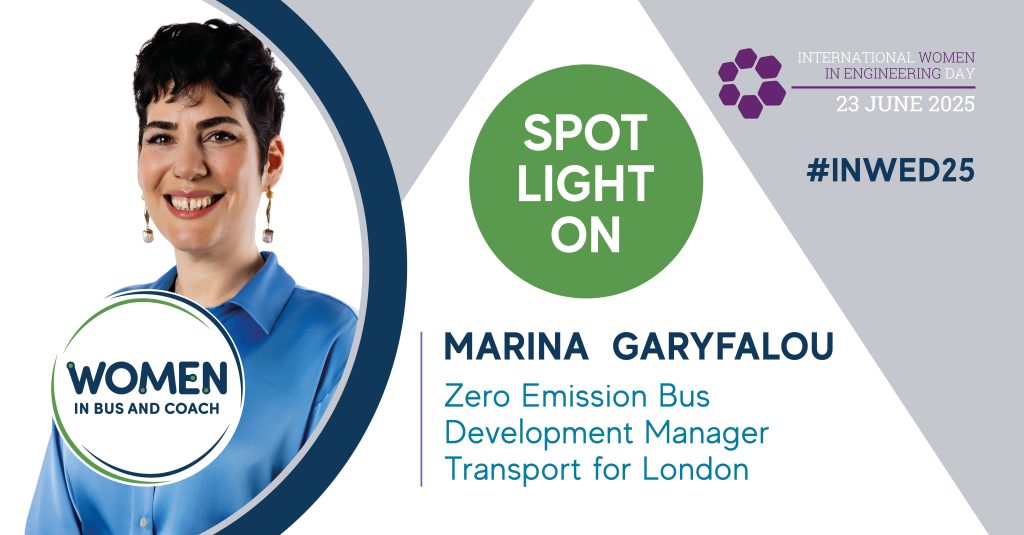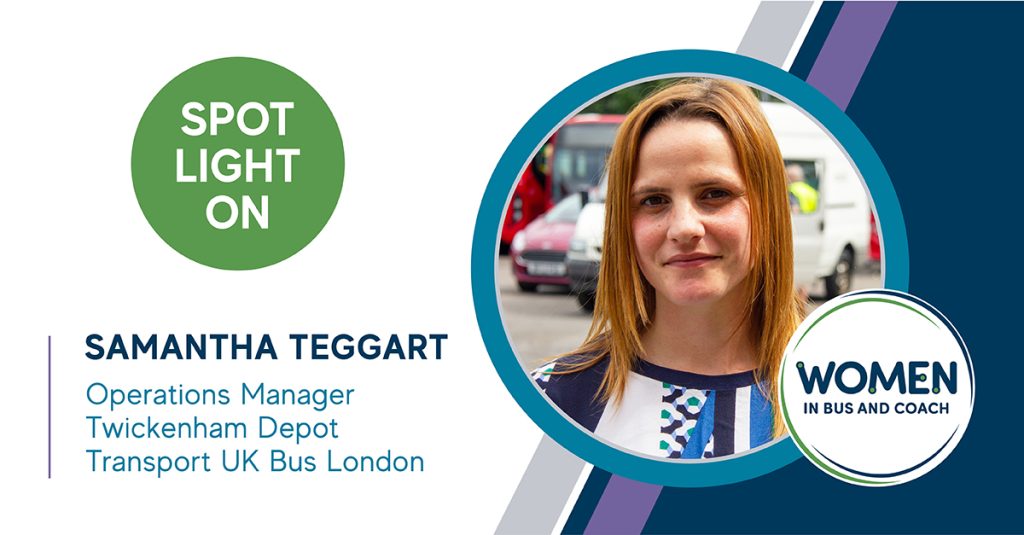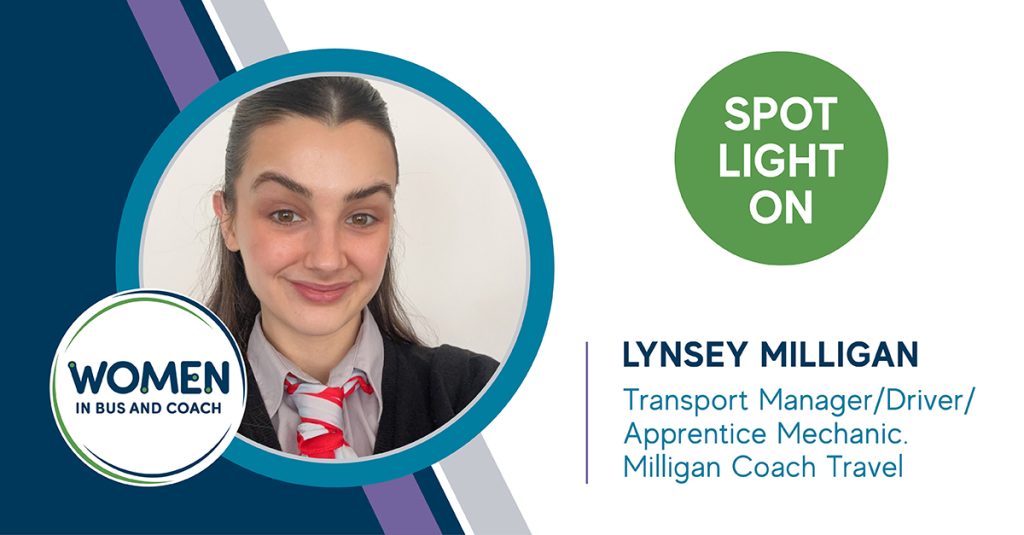The Women in Bus and Coach “Spotlight On” initiative shines a light on the incredible contributions of women in all roles across the bus, coach, and community transport sector. From professional drivers and engineers to human resources experts and CEO’s, ‘Spotlight On’ will highlight the diverse talents and achievements of women in this dynamic industry.
In support of International Women in Engineering Day, today we focus on and find out about:
Mary Garyfalou
Zero Emission Bus Development Manager
Transport for London
Was engineering something you always wanted to do? How did this career come to mind?
Growing up, I never imagined becoming an engineer—I had no exposure to the field. But after doing well in my GCSEs, someone suggested civil engineering. The idea of shaping cities and improving lives through infrastructure really inspired me. During my studies, I discovered the fascinating world of transportation, and that’s where I found my true passion. In Greece, civil engineering opens the door to transportation, and that path has shaped my career ever since.
Did anyone inspire or support you along the way?
My greatest inspiration and support have always been my high school physics teacher. She believed in me when I didn’t believe in myself and showed me that I could achieve anything I dreamed of. She’s still my mentor—and now, a cherished friend.
How did you get to where you are today?
My path to engineering wasn’t easy. While studying civil engineering in Greece—a five-year program—I worked to support myself, which sometimes made me question my future in the field. But I pushed through, and then completed another transportation-focused master’s as top of my class, even while recovering from a serious back injury and surgery.
After many different roles, I landed my first job as a transportation engineer with Greece’s largest highway operator. I later moved to the UK during the pandemic to join the Transportation Research Laboratory, where I progressed to Head of Environment and Decarbonisation within three years.
Today, having built a career in transportation decarbonisation, I work in the Zero Emission Buses team at TfL. I owe much of my journey to the mentors and supporters who guided me throughout this journey – because no one succeeds alone.
Did you experience any challenges getting to where you are today?
The road to where I am today was filled with challenges. I faced financial hardship, worked long hours alongside demanding studies—64 courses in civil engineering, 18 more in my master’s, plus two theses. This intense workload led to physical injuries and burnout.
Moving to the UK during the isolation of COVID-19 brought its own struggles: loneliness, adapting to a new culture, and proving myself in a virtual world. But looking back, every challenge shaped me—and made the journey absolutely worth it.
If so, how did you overcome them?
I overcame these challenges through persistence, purpose, and the support of others. I stayed focused on my long-term goals, even when the short-term felt overwhelming. I learned to manage my time, ask for help, and lean on mentors who guided me through tough moments.
Moving to a new country during a pandemic was isolating, but I kept showing up, proving myself in a virtual world, and building connections wherever I could. Every setback became a lesson—and every small win, a reason to keep going.
At the end of the day, it is all about the sense of purpose and the people who build the community.
What do you like about the bus, coach or community transport sector?
What I love about working in transportation is its power to shape people’s lives. The impact is broader than most realise—from how we move to how we live. Knowing that my day-to-day work affects real people in real time gives me a deep sense of purpose.
These last years, my focus has been on improving the environment and reducing transport-related carbon emissions. It’s incredibly fulfilling to know that my work contributes to a more sustainable future.
What does a typical day look like?
It might sound cliché, but there really is no typical day in my work. One moment I’m speaking with bus operators to understand and solve operational challenges, the next I’m deep in technical discussions about power grid capacity or developing long-term strategies for zero-emission transport.
That’s what I love most – no two days are the same, and I’m constantly learning something new.
What’s one myth you’d like to bust about being an engineer?
One myth I’d love to bust is that engineering isn’t an attractive or creative role – especially for women. Engineering is incredibly broad, offering opportunities to do everything from strategic thinking and problem solving to zooming in on technical details and zooming out to see the bigger picture.
These are valuable skills for any profession. For example, I’m not in a traditional engineering role now, but my background helps me understand the context of complex discussions and contribute meaningfully—even when I’m not across every technical detail.
What advice would you give to women thinking about a career in the bus, coach or community transport sector?
Just go for it! There are so many diverse roles within these sectors, and I’m sure you’ll love the strong sense of community and the opportunity to make a real difference in people’s lives – every single day.
It’s one of the most meaningful ways to serve society (after doctors, of course! 😊).
What has been your bus, coach or community transport sector career highlight?
One of my biggest career highlights has been becoming an active member of Women in Bus and Coach (WiBC) and Women in Transport (WiT). The support and encouragement I’ve received from these communities has been incredible – people have generously helped me prepare for interviews, reviewed my work, and supported my growth.
Now, I’m proud to give back: I serve as the Mentee Engagement Lead for the WiT Advance mentoring programme, chair the Period Positive workstream at WiBC, and contribute to several other initiatives. It’s all about people supporting people – and that’s what makes this sector so special.
What three things could the bus, coach or community transport sector do to improve the industry for Women?
- Break the stigma around traditionally male-dominated roles by promoting visibility and representation of women across all levels.
- Remove barriers that prevent access for women with caregiving responsibilities—through flexible working, supportive policies, and inclusive workplace cultures.
- Ensure equity in opportunities, career progression, and rewards—so that women are equally recognised, valued, and empowered to lead.
Where do you see yourself in 5 years’ time?
In five years, I hope to have further developed my skills and progressed into industry-leading roles—continuing to grow professionally while staying actively involved in the communities that support and uplift others. Being part of those networks is just as important to me as any career milestone.
Anything else you would like to share?
I’d just like to say – don’t underestimate the power of community, purpose, and persistence. The transport sector is full of opportunities to make a real difference, and there’s space for everyone to grow, contribute, and lead.
If you’re considering this path, know that you don’t have to do it alone. There are incredible people and networks out there ready to support you – just like they did for me.
Thank you for sharing Marina, stories like yours make a real impact.
To find out more about who Marina works for, and career opportunities visit: https://tfl.gov.uk/corporate/careers/


